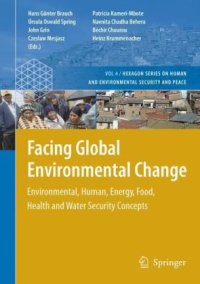
Ebook: Facing Global Environmental Change: Environmental, Human, Energy, Food, Health and Water Security Concepts
- Genre: Technique // Energy: Renewable Energy
- Tags: Environment general, Geography (general), Climate Change, Environmental Law/Policy/Ecojustice, Environmental Economics, Sociology
- Series: Hexagon Series on Human and Environmental Security and Peace 4
- Year: 2009
- Publisher: Springer-Verlag Berlin Heidelberg
- Edition: 1
- Language: English
- pdf
The year 2007 could perhaps accurately be described as the year when climate change finally received the attention that this challenge deserves globally. Much of the information and knowledge that was created in this field during the year was the result of the findings of the Fourth - sessment Report (AR4) of the Intergovernmental Panel on Climate Change (IPCC), which were disseminated on a large scale and reported extensively by the media. This was the result not only of a heightened interest on the part of the public on various aspects of climate change, but also because the IPCC itself proactively attempted to spread the findings of its AR4 to the public at large. The interest generated on the scientific realities of climate change was further enhanced by the award of the Nobel Peace Prize to the IPCC and former Vice President of the US, Al Gore. By taking this decision in favour of a leader who has done a great deal to create awareness on c- mate change, and a body that assesses all scientific aspects of climate change and disseminates the result of its findings, the Norwegian Nobel Committee has clearly drawn the link between climate change and peace in the world.
This policy-focused, global and multidisciplinary security handbook on Facing Global Environmental Change addresses new security threats of the 21st century posed by climate change, desertification, water stress, population growth and urbanization. These security dangers and concerns lead to migration, crises and conflicts. They are on the agenda of the UN, OECD, OSCE, NATO and EU. In 100 chapters, 132 authors from 49 countries analyze the global debate on environmental, human and gender, energy, food, livelihood, health and water security concepts and policy problems. In 10 parts they discuss the context and the securitization of global environmental change and of extreme natural and societal outcomes. They suggest a new research programme to move from knowledge to action, from reactive to proactive policies and to explore the opportunities of environ-mental cooperation for a new peace policy.